17 Sergeant Resume Examples
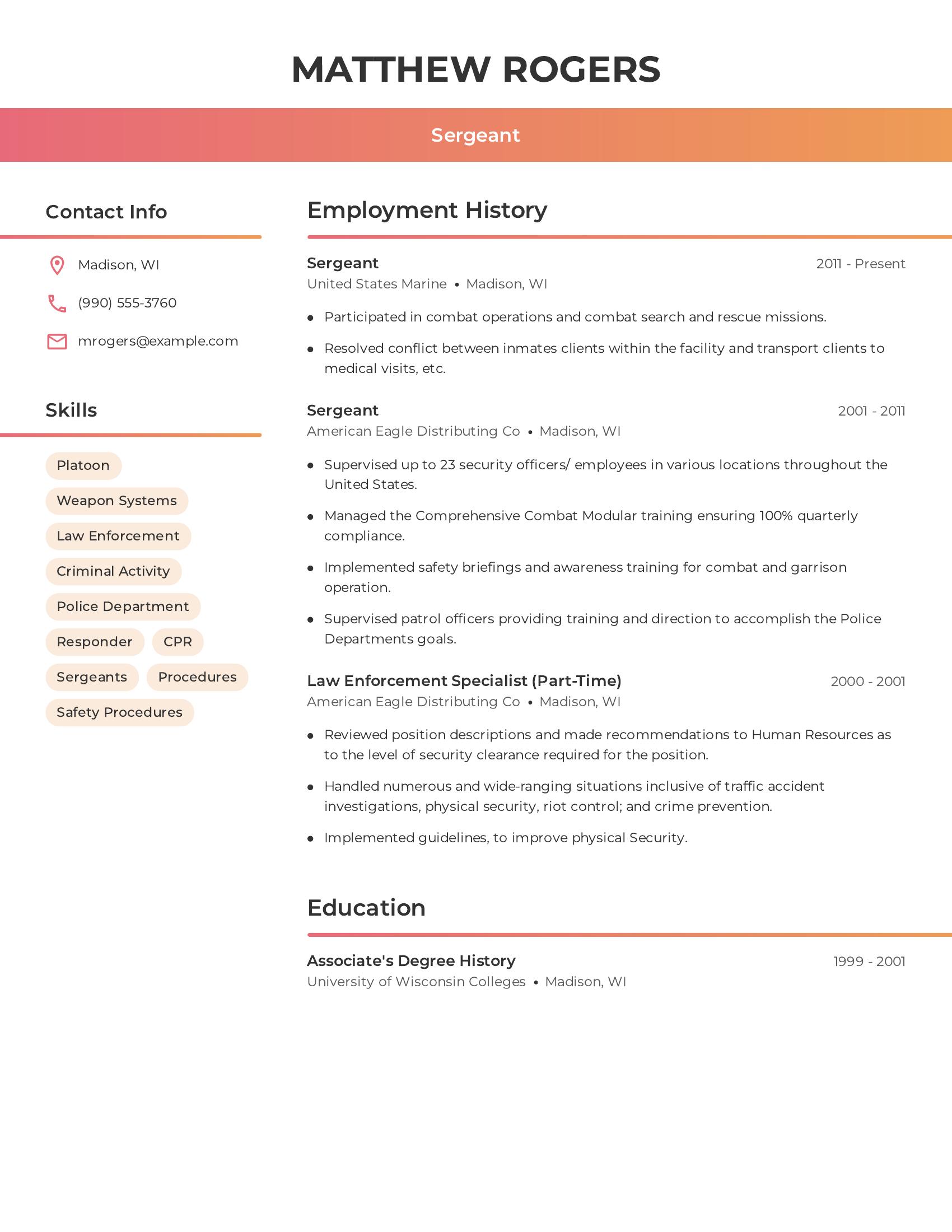



Sergeant resumes should highlight leadership, law enforcement experience, and specific skills relevant to the role. It should include contact information, skills such as platoon management and weapon systems, employment history with clear job titles and durations, and education. Clear descriptions of duties and achievements show the candidate's ability to handle various scenarios and responsibilities.
This resume includes all necessary components. It lists contact information, a range of relevant skills, and detailed employment history showing a progression in roles and duties. The education section is concise but informative. Specific tasks like supervising officers and implementing safety briefings demonstrate practical experience in leadership and law enforcement.

Staff sergeant resumes should highlight leadership, tactical operations, and extensive training experience. They should showcase skills in managing personnel, strategic planning, and coordination with various agencies. A good resume includes clear work history, specific roles, and demonstrated responsibilities within military and law enforcement contexts.
This resume includes a detailed work history with specific dates and job titles that show progression from military police officer to staff sergeant. It lists duties such as planning tactical operations, managing security activities, and coordinating with other agencies. The skills section highlights relevant abilities like K-9 training and federal law knowledge. Education background is also provided.
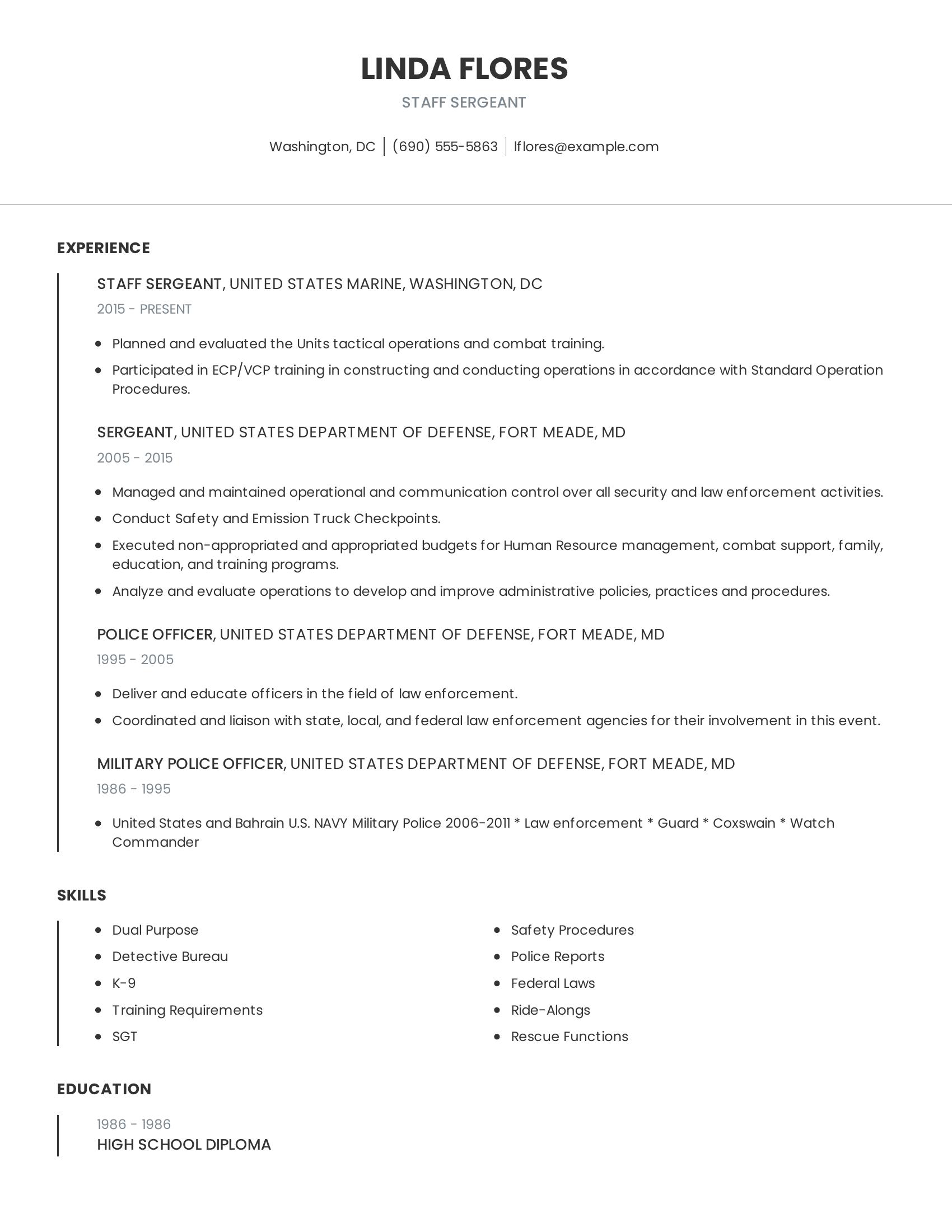
Platoon sergeant resumes should highlight leadership experience, training expertise, and operational skills. They should cover the management of personnel, execution of missions, and ability to handle high-pressure situations. Key elements include details about training programs led, specific duties carried out, and any special recognitions or deployments. Clear bullet points that showcase these experiences effectively communicate the candidate's qualifications.
This resume includes these specifics by detailing the candidate's role in training Marines in various operations, leadership in combat missions, and oversight of a squad's development. It mentions multiple combat deployments and illustrates a strong track record in both field operations and administrative duties. The resume also lists previous ranks and roles, demonstrating a progression of responsibility and expertise over time.
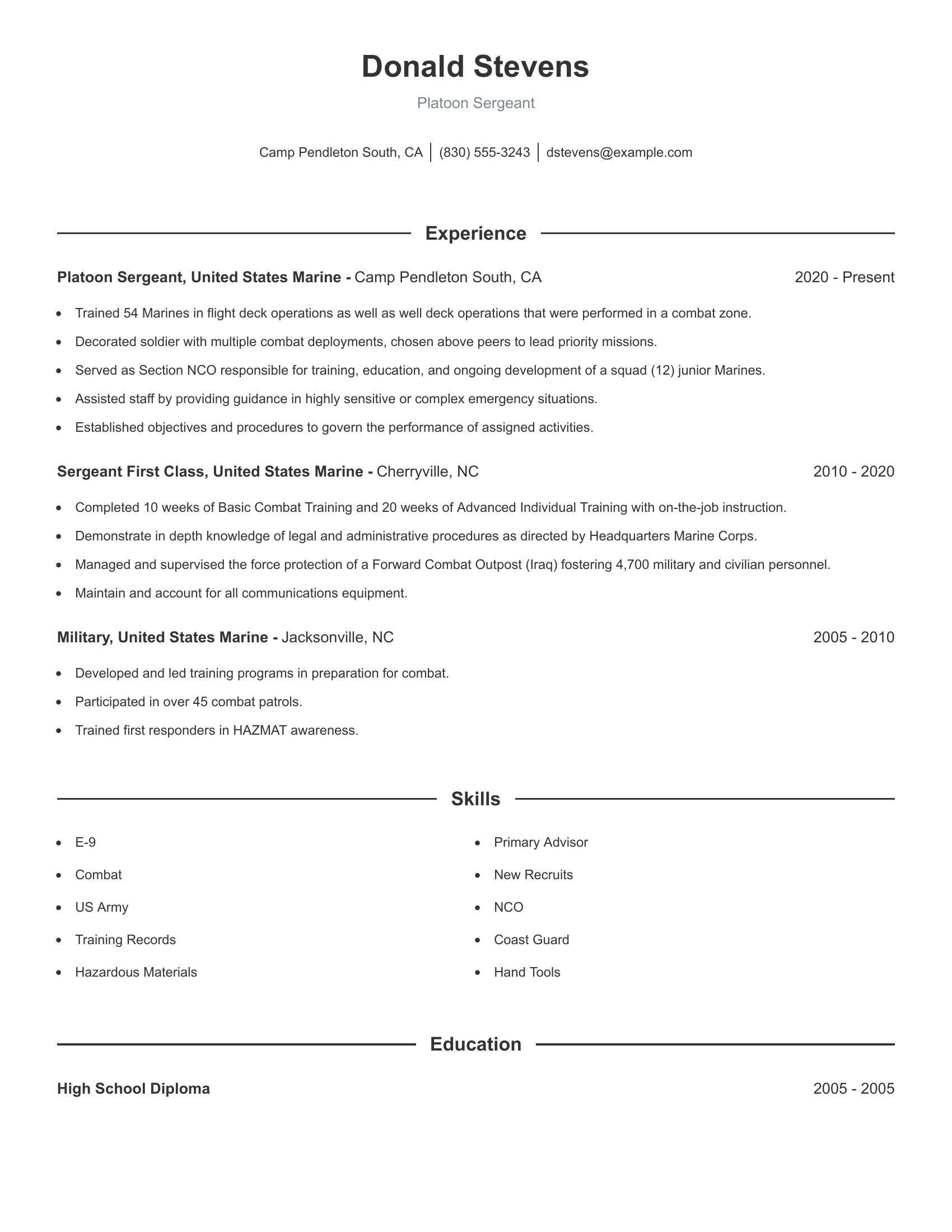
Sergeant first class resumes should highlight leadership, management, and operational skills. They should show experience in coordinating and supervising military operations. A good resume includes roles and responsibilities, such as enforcing safety procedures, managing teams, and training soldiers. It also lists relevant skills like combat operations, tactical employment, and disciplinary actions.
This resume effectively includes these specifics. It lists experience as a sergeant first class with responsibilities like enforcing safety procedures and managing programs. The resume also details previous roles such as squad leader and correction officer, showing a progression of leadership and operational expertise. Skills listed are relevant to military operations and leadership.
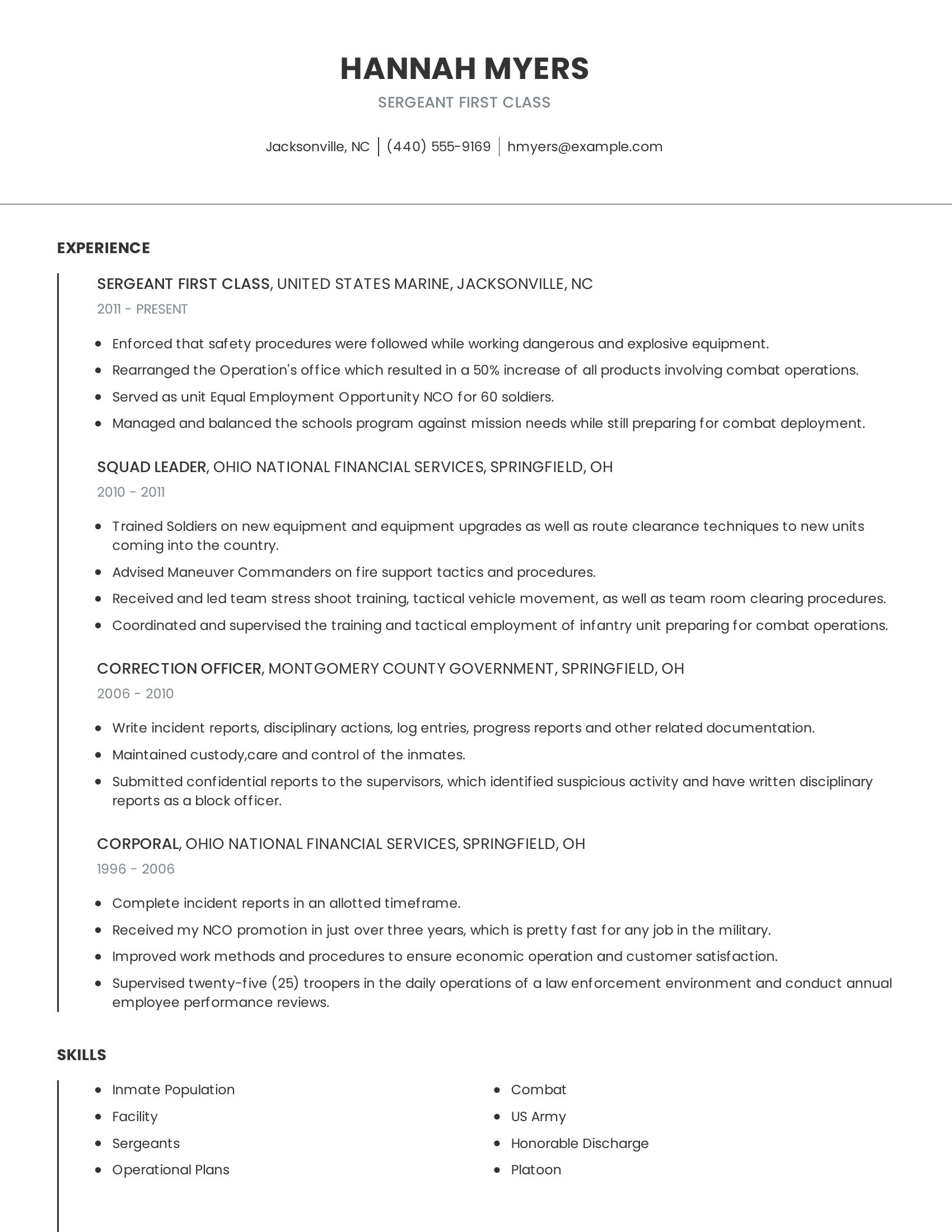
Operations sergeant resumes should highlight leadership, strategic planning, and logistics management skills. They need to show experience in maintaining and operating military equipment, supervising sections, and coordinating unit logistics. Clear descriptions of responsibilities and achievements help potential employers understand the candidate's expertise in managing operations efficiently. The resume should also mention any additional training or certifications relevant to the role.
This resume includes those specifics by detailing responsibilities like developing procedures for maintenance activities, supervising battalion operations, and coordinating logistics. It shows experience in leadership roles at different organizations, highlighting tasks such as facilitating kaizen projects, managing safety procedures, and training staff members. The inclusion of various roles across different organizations helps demonstrate a broad skill set relevant to the position of an operations sergeant.
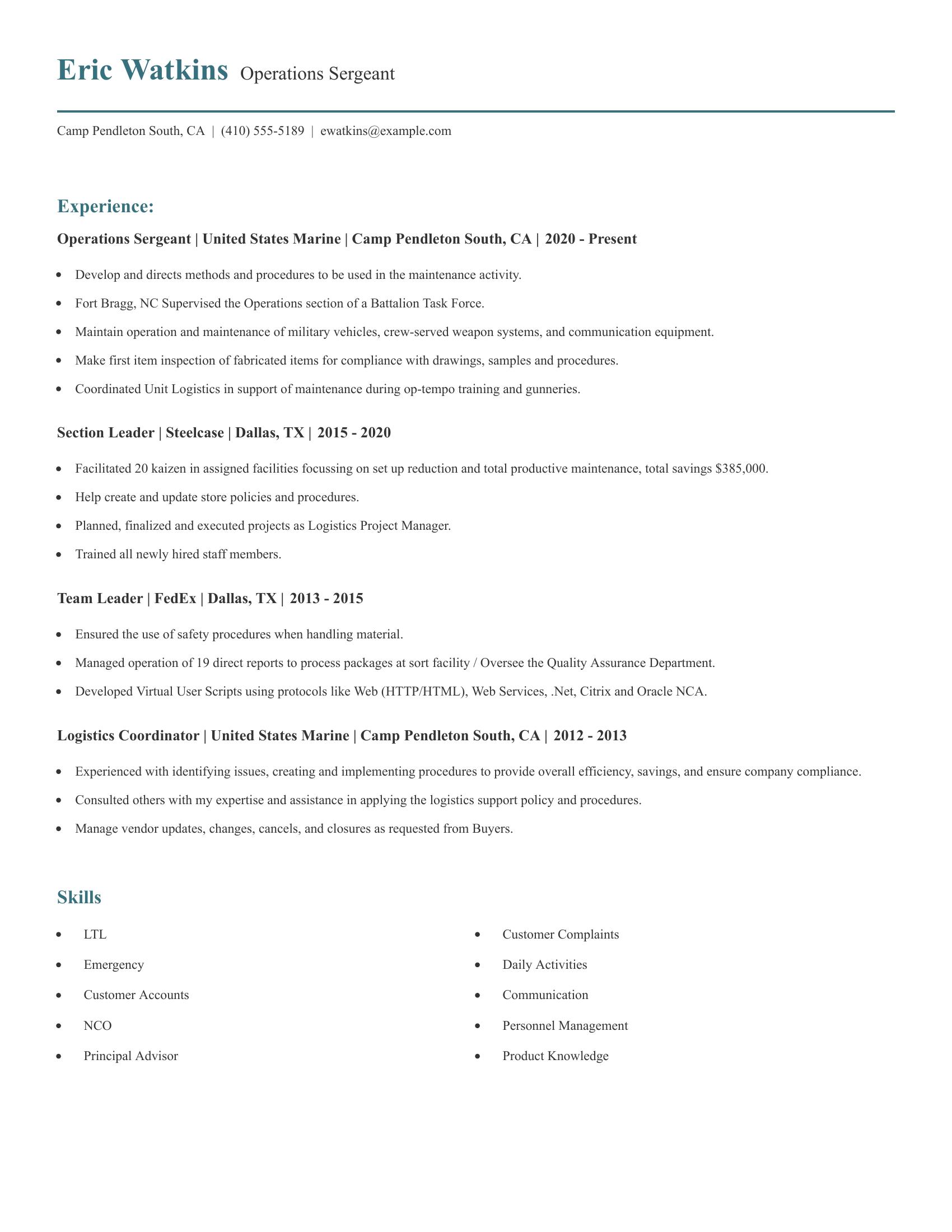
Corporal resumes should highlight leadership, teamwork, and technical skills gained through military service. They need to showcase experience in enforcing safety protocols, managing equipment, and training personnel. Additionally, it's important to include any specialized training and relevant employment history that demonstrates versatility and reliability.
This resume includes those specifics by listing roles in the military and civilian sectors. It details the enforcement of safety procedures, maintenance tasks, and specialized training as a heavy equipment operator. The resume also mentions leadership roles such as serving as an Armor Platoon Sergeant and team Combat Life Saver, showcasing a breadth of experience and responsibility.
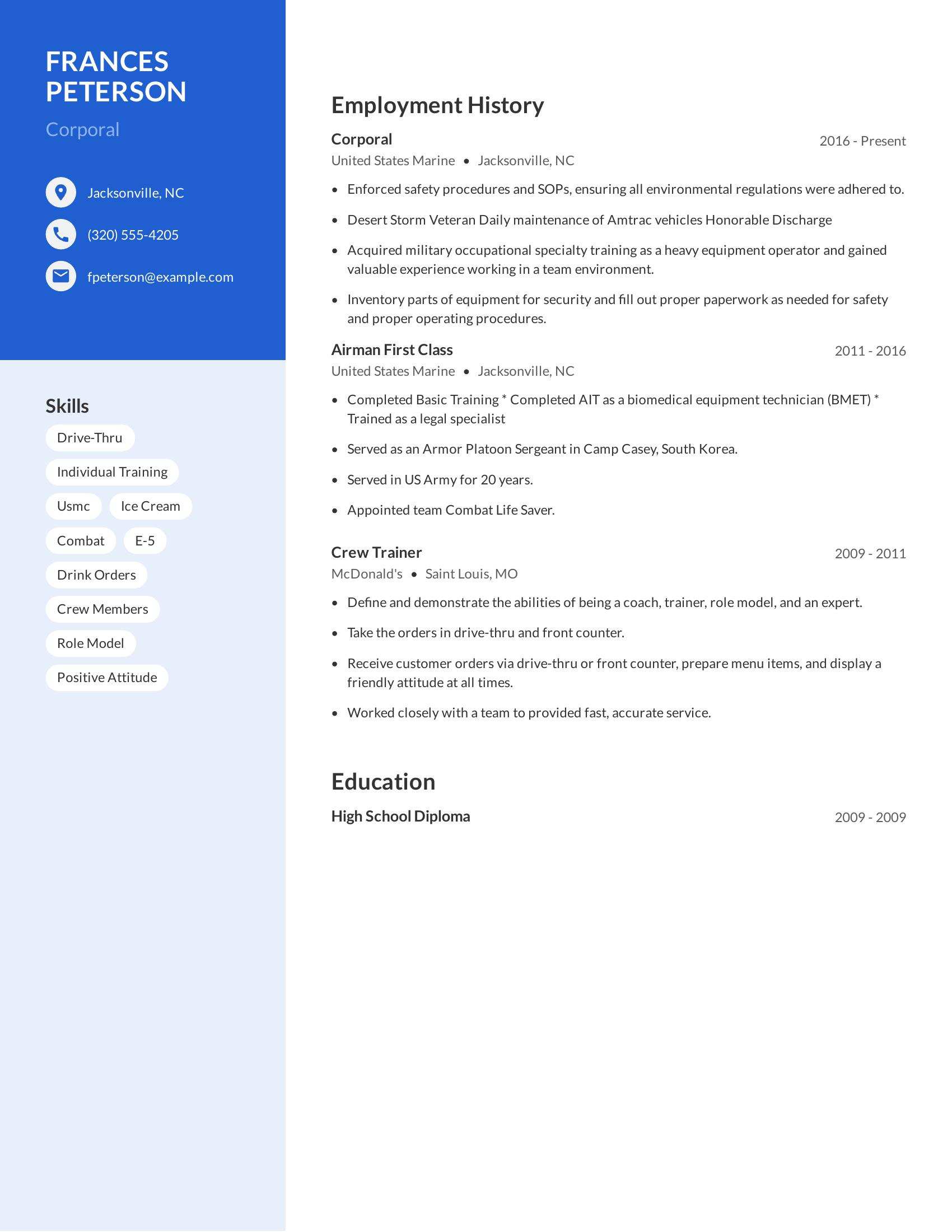
Training sergeant resumes should highlight leadership abilities, experience in training and development, and effective communication skills. They should show an ability to manage teams, handle administrative tasks, and use technology to improve processes. A good resume also includes specific achievements and quantifiable results.
This resume includes details that align with those specifics. It lists experience managing and training employees at Walmart, optimizing SharePoint for better organization, and maintaining personnel files. The candidate’s military background shows their ability to use communication equipment in combat, establish relationships with law enforcement, and manage training under budget constraints. Their educator role showcases skills in following directions and creating specialized study units.
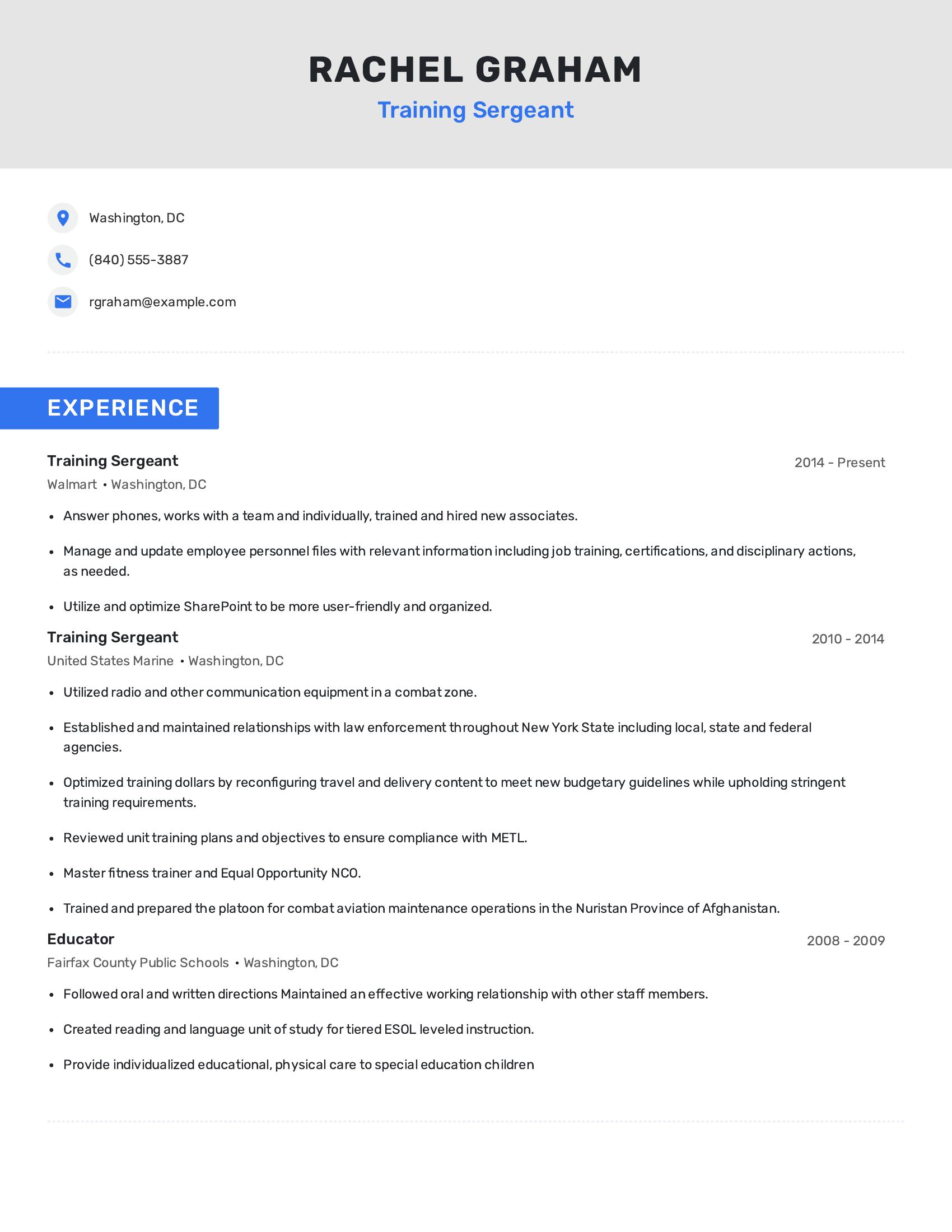
First Sergeant resumes should highlight leadership, training, and operational management experience. They need to showcase skills in personnel management, resource allocation, and combat readiness. A good resume also includes relevant education and prior roles that build up to the first sergeant position. Clear documentation of duties and achievements in each role is key.
This resume contains specific experiences that align well with a first sergeant's responsibilities. It lists relevant positions held in the military and educational institutions, detailing tasks such as training personnel, managing resources, and providing instruction. The inclusion of a bachelor's degree supports the candidate's qualifications. Additionally, the skills section reflects practical abilities related to the job.
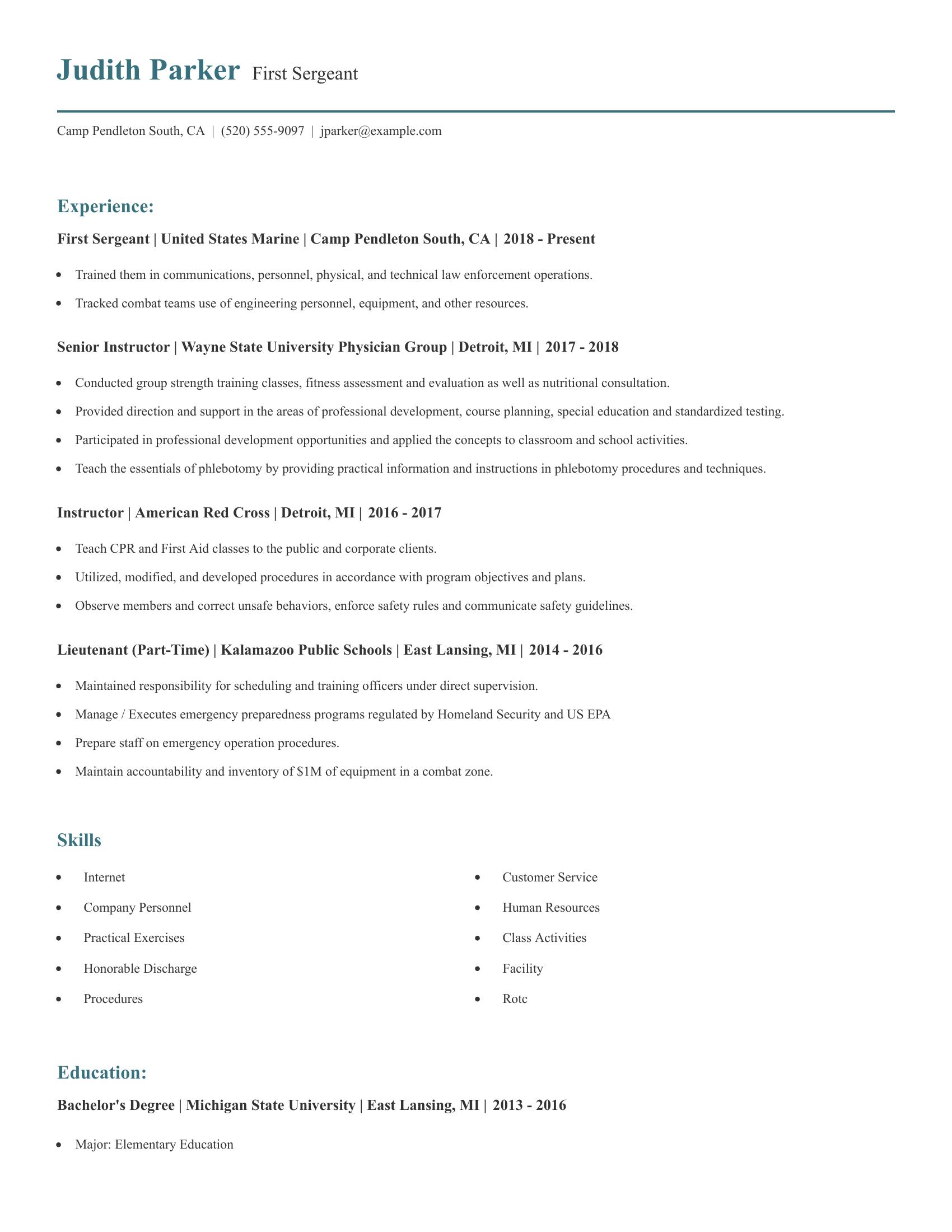
Master sergeant resumes highlight military leadership, training, operations management, and administrative duties. A well-crafted resume should show experience in leading personnel, training soldiers, developing procedures, and managing operations. It should also demonstrate skills in combat readiness, law enforcement, and logistics. Key elements include job titles, dates of service, locations, and specific responsibilities that illustrate the candidate's expertise and achievements.
This resume effectively includes those specifics by detailing the master sergeant's roles at various positions. It lists employment history with clear job titles and dates, showing a progression of responsibility. The resume describes duties such as training soldiers on inventory systems, developing procedures for compliance, conducting urinalyses for combat readiness, and managing personnel during combat operations. It also includes a section on skills relevant to military and law enforcement contexts, demonstrating a broad range of expertise.
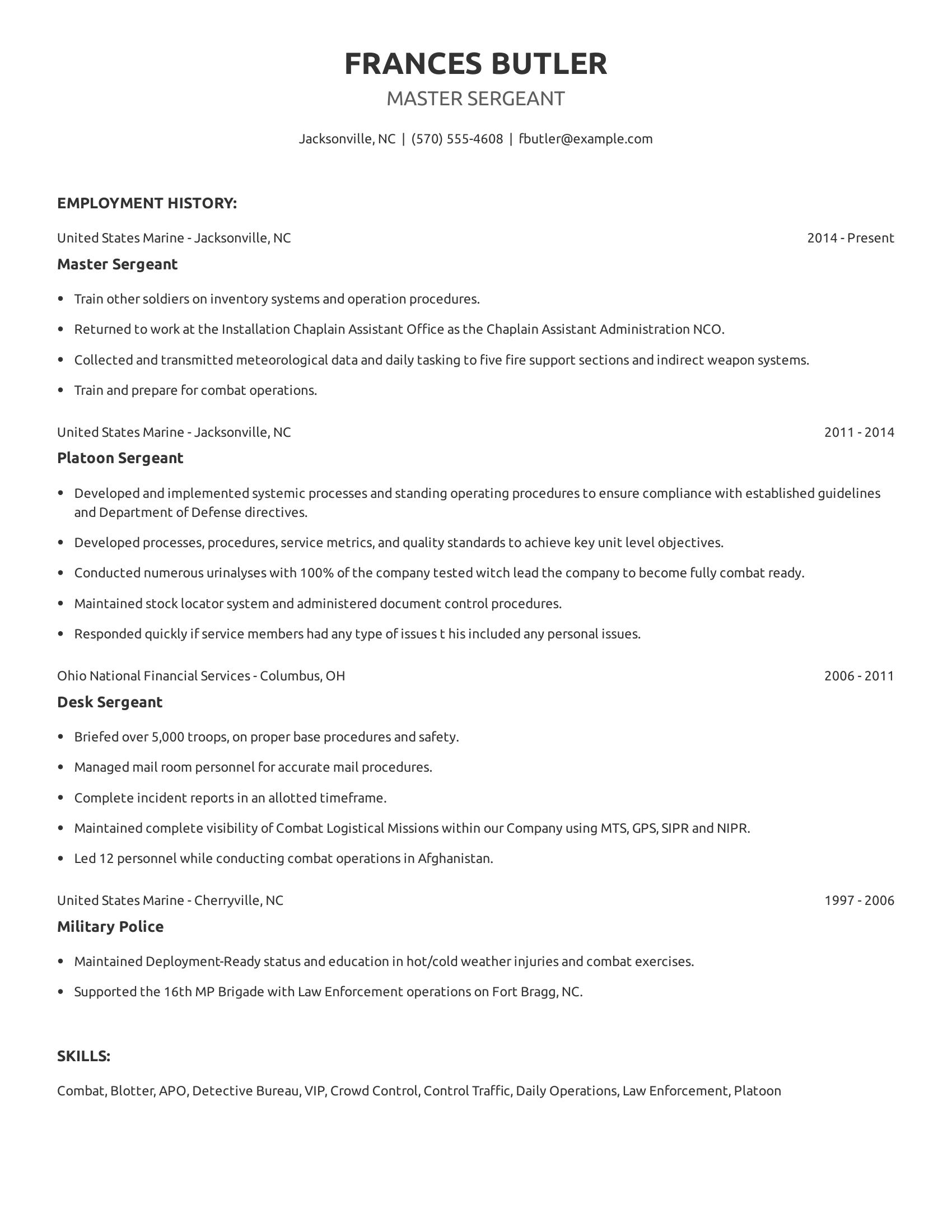
Desk sergeant resumes should highlight experience in managing operations, personnel, and safety procedures. Candidates need to show strong communication skills, leadership in coordinating with teams, and the ability to handle logistical and administrative tasks efficiently. A good resume also includes relevant education and specific skills that demonstrate the candidate's ability to maintain order and manage resources effectively.
This resume includes these specifics by detailing the candidate's roles in briefing troops, managing mail room personnel, and authoring procedures. It shows leadership experience through roles like Brigade Commander and Watch Commander. The resume also lists relevant skills such as personnel management and payroll, along with a bachelor's degree in business, which supports their capability in handling desk sergeant responsibilities.
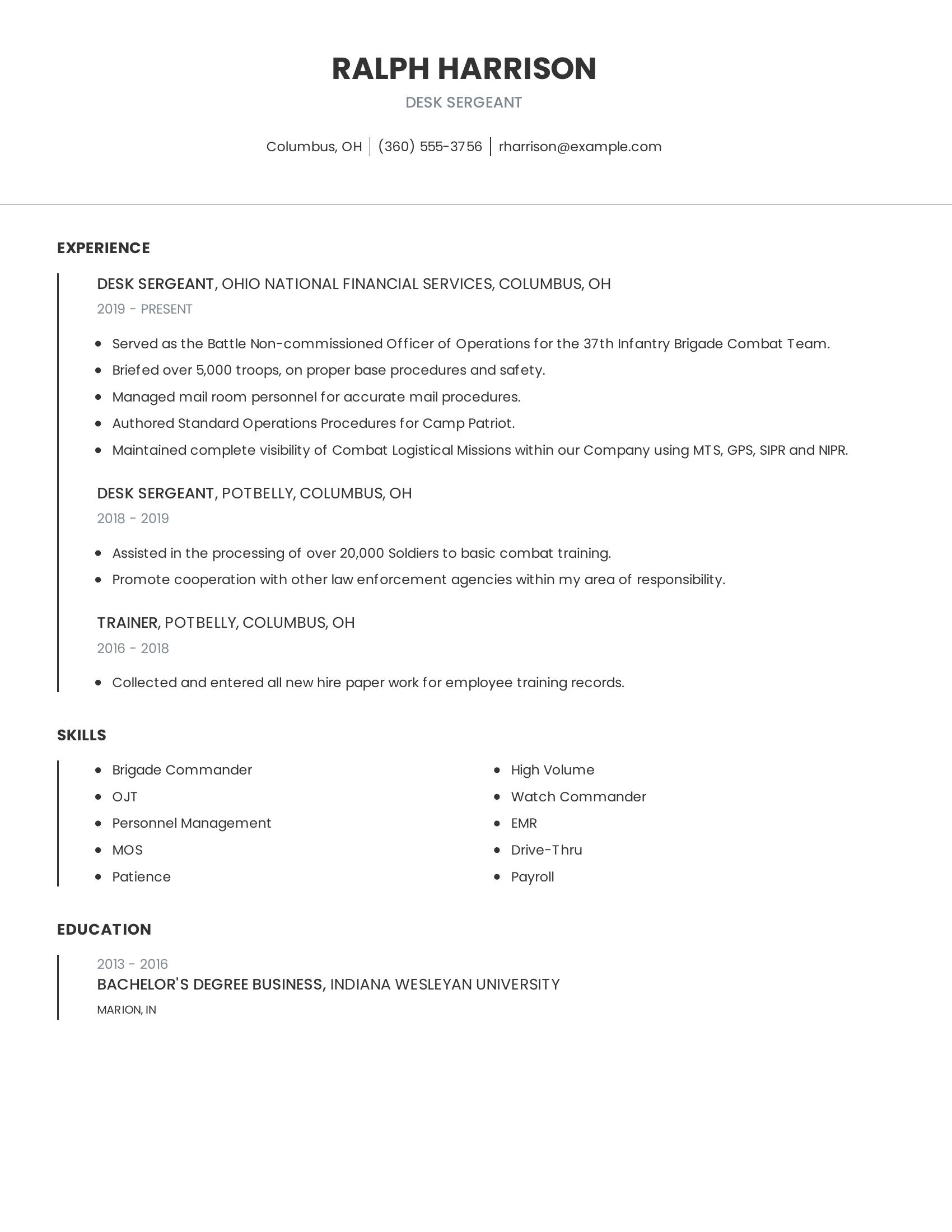
Non-commissioned officer resumes should highlight leadership experience, operational expertise, and a strong history of military service. They should include specific roles and responsibilities, such as managing deployments, developing policies, and conducting training. Key projects and accomplishments, like leading missions or improving procedures, are also important. The resume should clearly present the officer’s progression through ranks and their contributions to unit readiness and mission success.
This resume includes the necessary elements. It outlines the officer's experience in various roles, mentioning combat deployments and leadership in critical projects. The resume details specific duties such as standardizing policies, interpreting regulations, and coordinating training programs. It also notes significant achievements like leading a scout platoon without losses. The clear timeline of service and specific contributions showcases the officer's extensive military background.
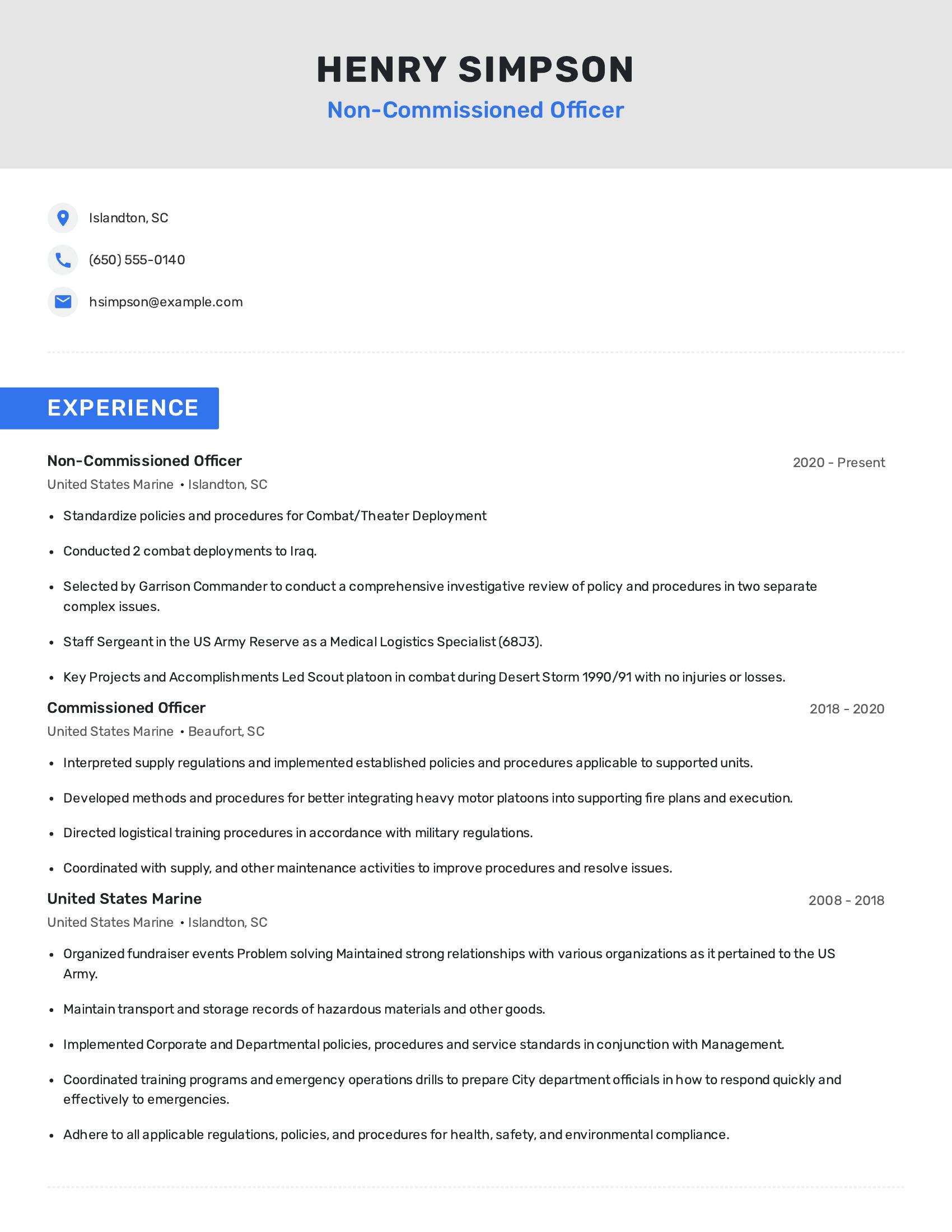
Sergeant and team leader resumes should highlight leadership skills, operational expertise, and the ability to train and manage personnel. Key elements include specific duties performed, such as developing standard operating procedures, conducting training, and overseeing safety protocols. Experience in various roles within the organization, showcasing progression and versatility, is also important.
This resume includes relevant specifics by detailing the individual's progression from correction officer to lieutenant to sergeant and team leader. It outlines various responsibilities like developing SOPs, supervising staff, conducting training, and ensuring safety. Additionally, it highlights diverse skills including public safety, inmate management, and equipment maintenance.
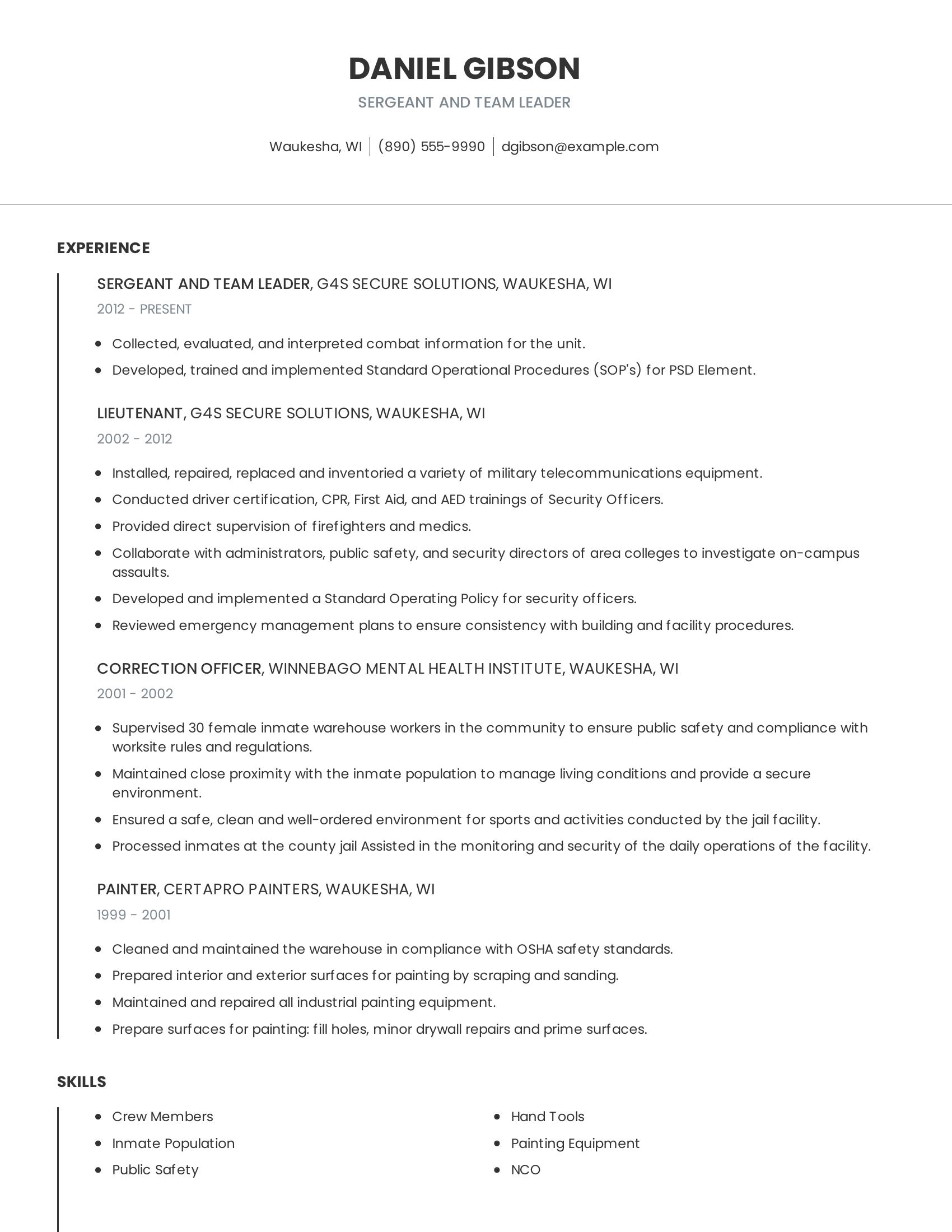
Drill sergeant resumes should highlight leadership experience, military training, and the ability to manage personnel. Key elements include a clear record of service, relevant skills such as technical training and personnel management, and a history of coordinating logistics and training programs. Awards and recognitions, such as combat ribbons and medals, also add value by showcasing dedication and accomplishments in service.
This resume includes important specifics like leadership roles, training and coordination responsibilities, and notable awards. The candidate's work history details their experience in managing subordinate units, implementing training courses, and handling emergency situations. The resume also lists relevant skills such as technical training and personnel management, which are crucial for a drill sergeant role.
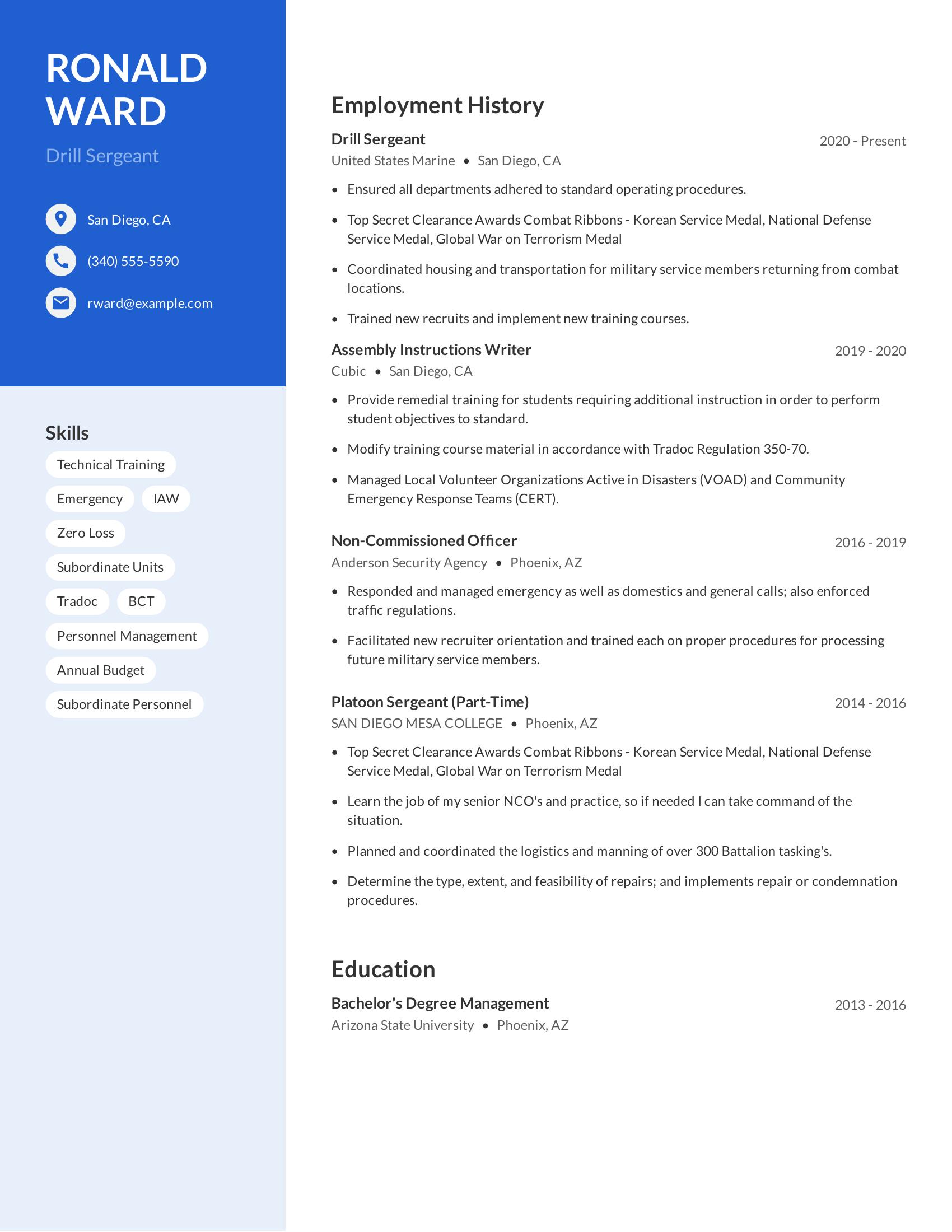
Lieutenant resumes should highlight leadership, law enforcement experience, and the ability to handle emergencies. The resume should include a clear job title, contact information, work experience with dates, specific duties performed, skills related to the job, and education background. It is important to show a progression in roles and responsibilities to demonstrate career growth and capability in managing teams and high-stress situations.
This resume effectively includes the necessary elements for a lieutenant position. It lists relevant work experience in law enforcement, detailing specific duties such as supervising new officers, maintaining security, and conducting patrols. Skills pertinent to the role are mentioned, like handling emergency situations and enforcing laws. The educational background is clearly stated with a degree in criminal justice, supporting the candidate’s qualifications for the role.
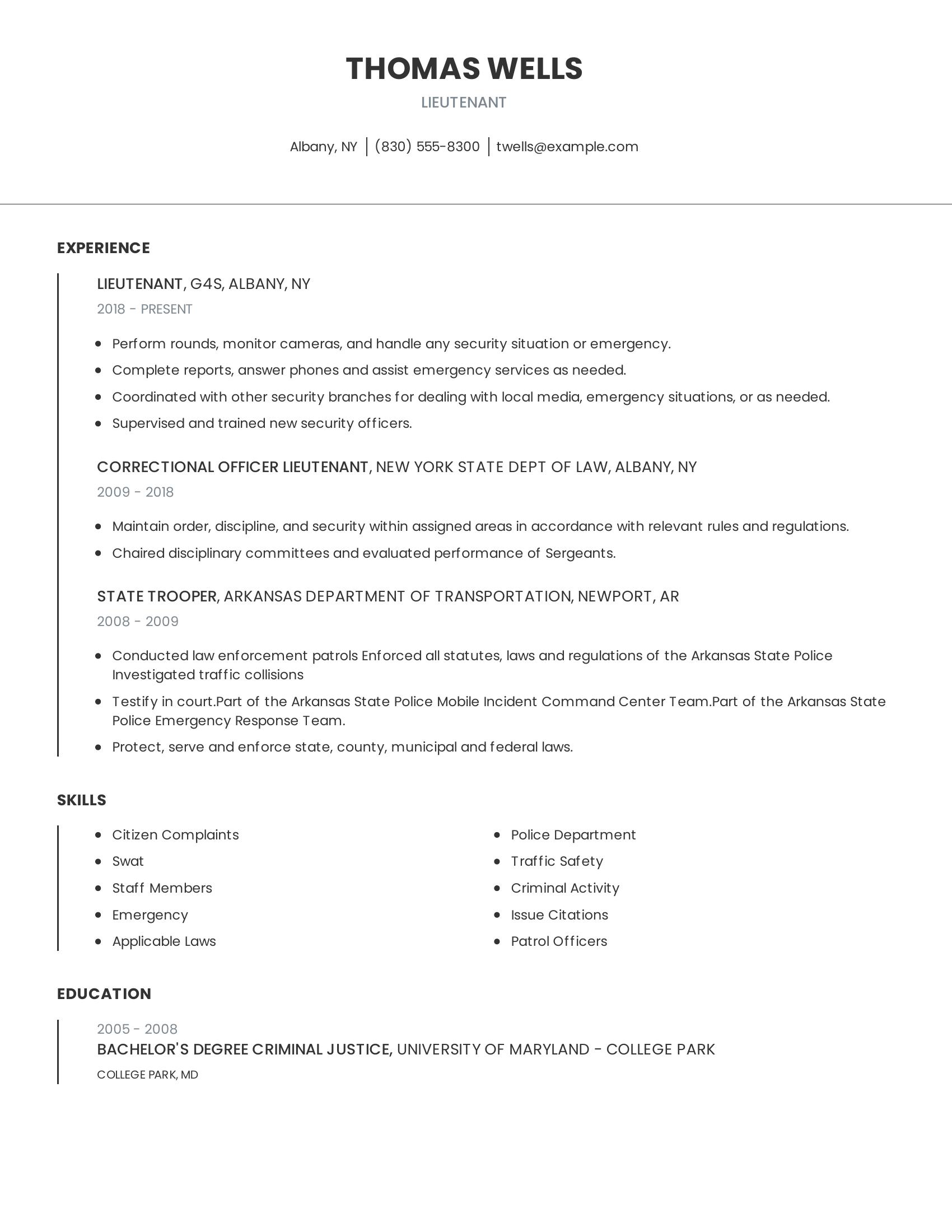
Command sergeant major resumes should highlight leadership experience, military training, and relevant skills. They should detail roles held, responsibilities managed, and the impact of their work. Important elements include job titles, employment history with dates, and specific tasks performed. Skills related to personnel management, training, and operations are crucial. Clear and concise descriptions of duties and achievements make a strong resume.
This resume includes many of these elements. It lists job titles with dates and locations, showing a clear career progression. The employment history details specific tasks like training officers, coordinating activities with law enforcement, and managing unit readiness. The skills section highlights relevant abilities in personnel management and public safety. The resume also mentions technical skills in software like Word and Excel.
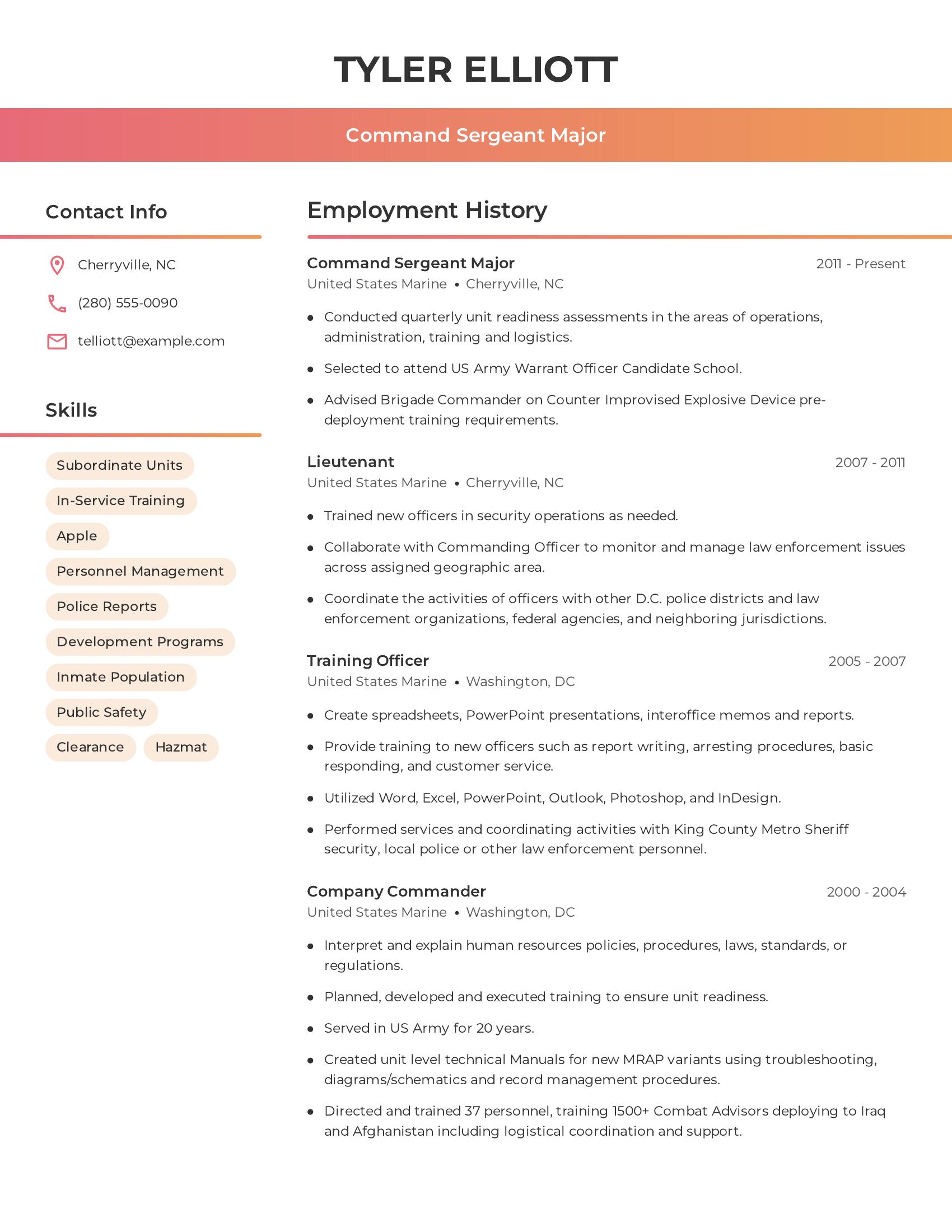
Patrol sergeant resumes should highlight experience in law enforcement, leadership roles, and relevant skills. They should include specific job duties, achievements, and any special training or certifications. Education background is also important, along with clear contact information. A good resume is concise, easy to read, and directly related to the job role.
This resume includes relevant job titles like patrol sergeant and security specialist. It lists specific duties such as consulting with agencies, firearm licensing, and launching new patrol units. The resume also covers achievements and responsibilities in previous roles, along with educational background. Contact information is clearly provided at the top.
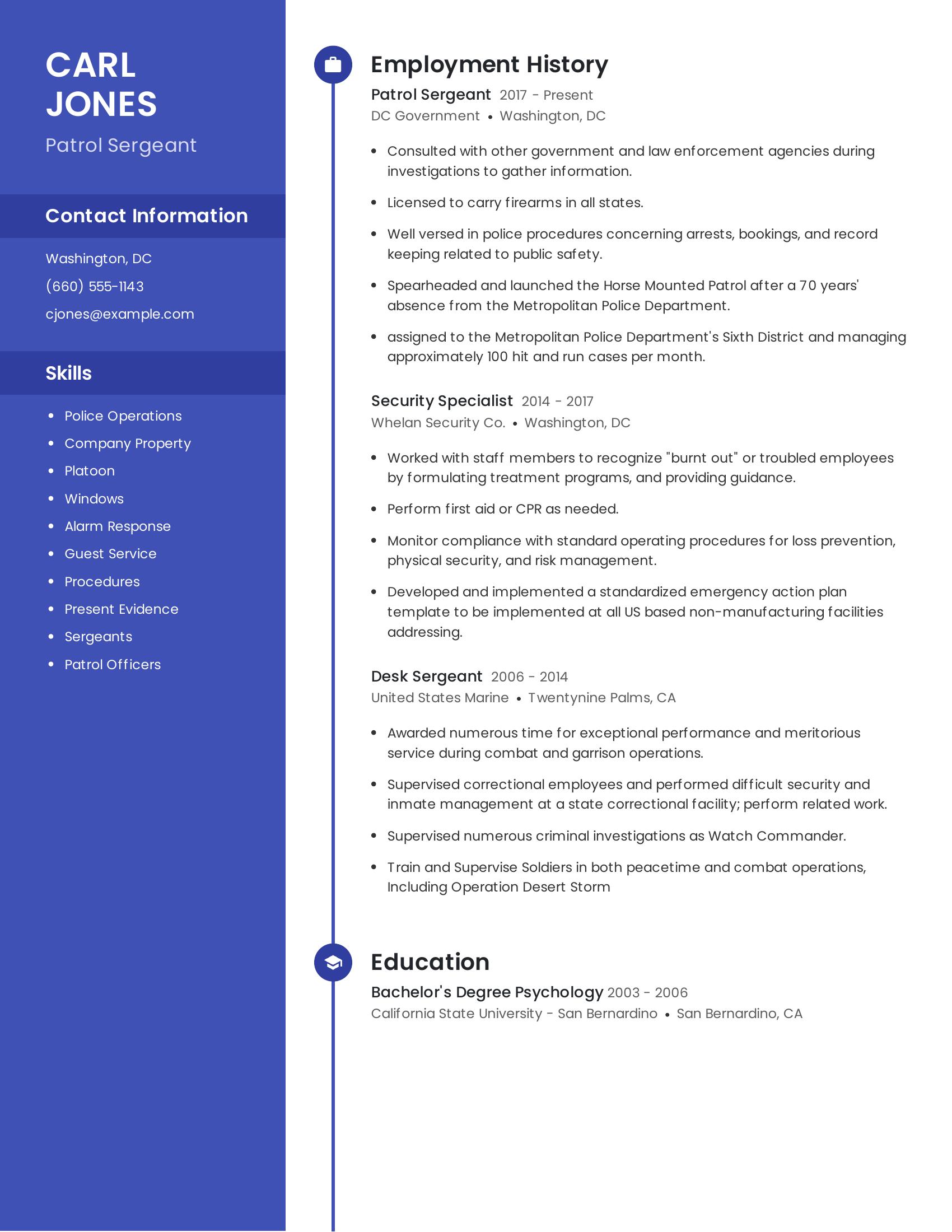
Police sergeant resumes should highlight leadership experience, law enforcement skills, and relevant education. A strong resume includes details about managing teams, overseeing security operations, and providing training. It should also mention specific duties like patrolling high-crime areas, responding to emergencies, and presenting evidence in court. Education in law enforcement and any specialized training or certifications add value.
This resume effectively includes those specifics. It outlines the candidate's extensive experience in various law enforcement roles, such as working with the Department of Defense and city police departments. The resume mentions key duties like supervising special events, providing instruction on security policies, and tactical operations experience. It also lists relevant education and specialized skills acquired over the years.
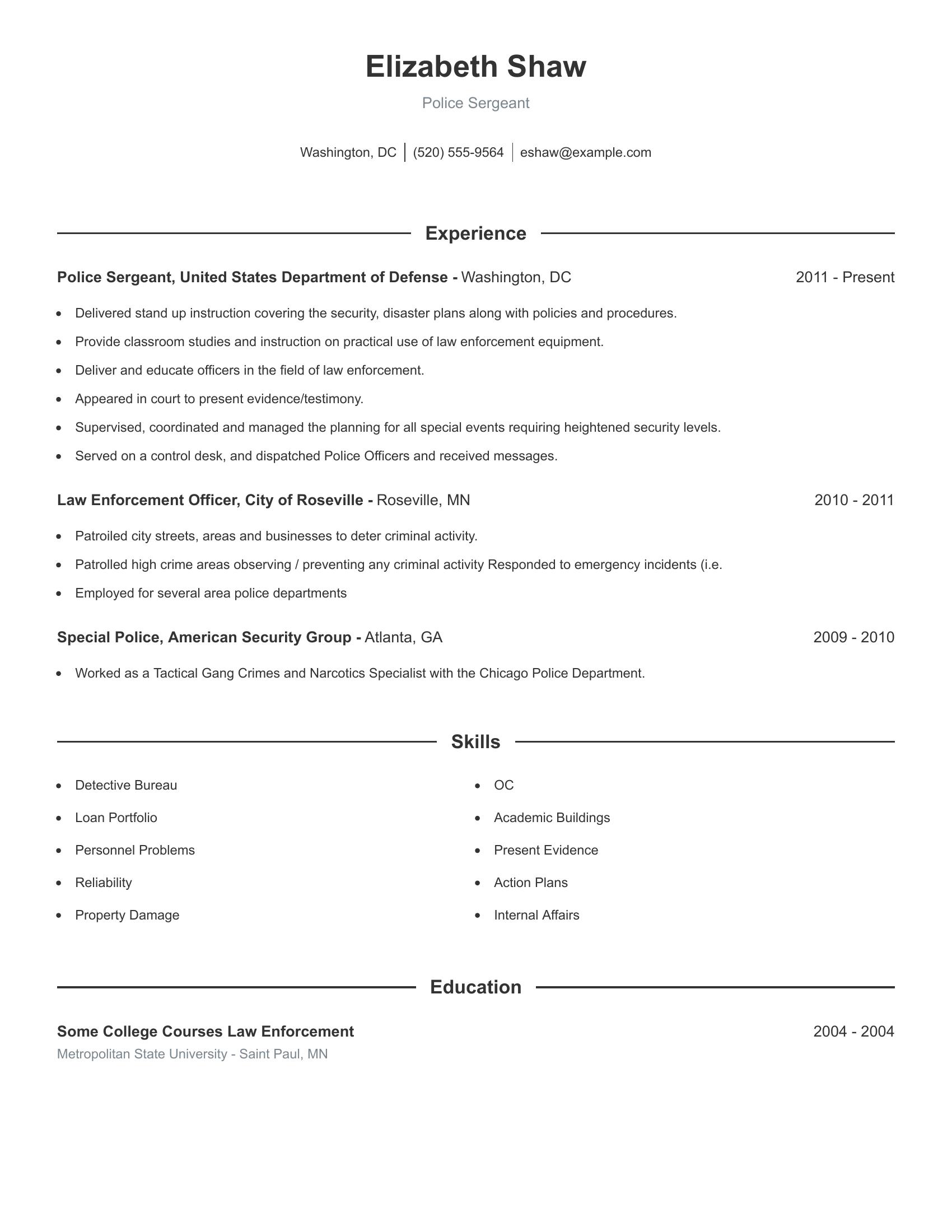
Supply sergeant resumes should highlight experience in managing military supplies, maintaining inventory systems, and overseeing logistics. Key elements include clear job history with specific duties, relevant skills like handling tools and safety procedures, and experience in different departments. A good resume also shows leadership roles, such as directing programs or leading teams in logistics operations.
This resume includes specific details about the supply sergeant's duties at each position. It lists skills such as handling hand tools and following safety procedures. The employment history is clear, showing progression from a warehouse clerk to a supply sergeant, with detailed descriptions of responsibilities in each role. The resume also shows leadership experience and the ability to manage logistics technology and property accountability.
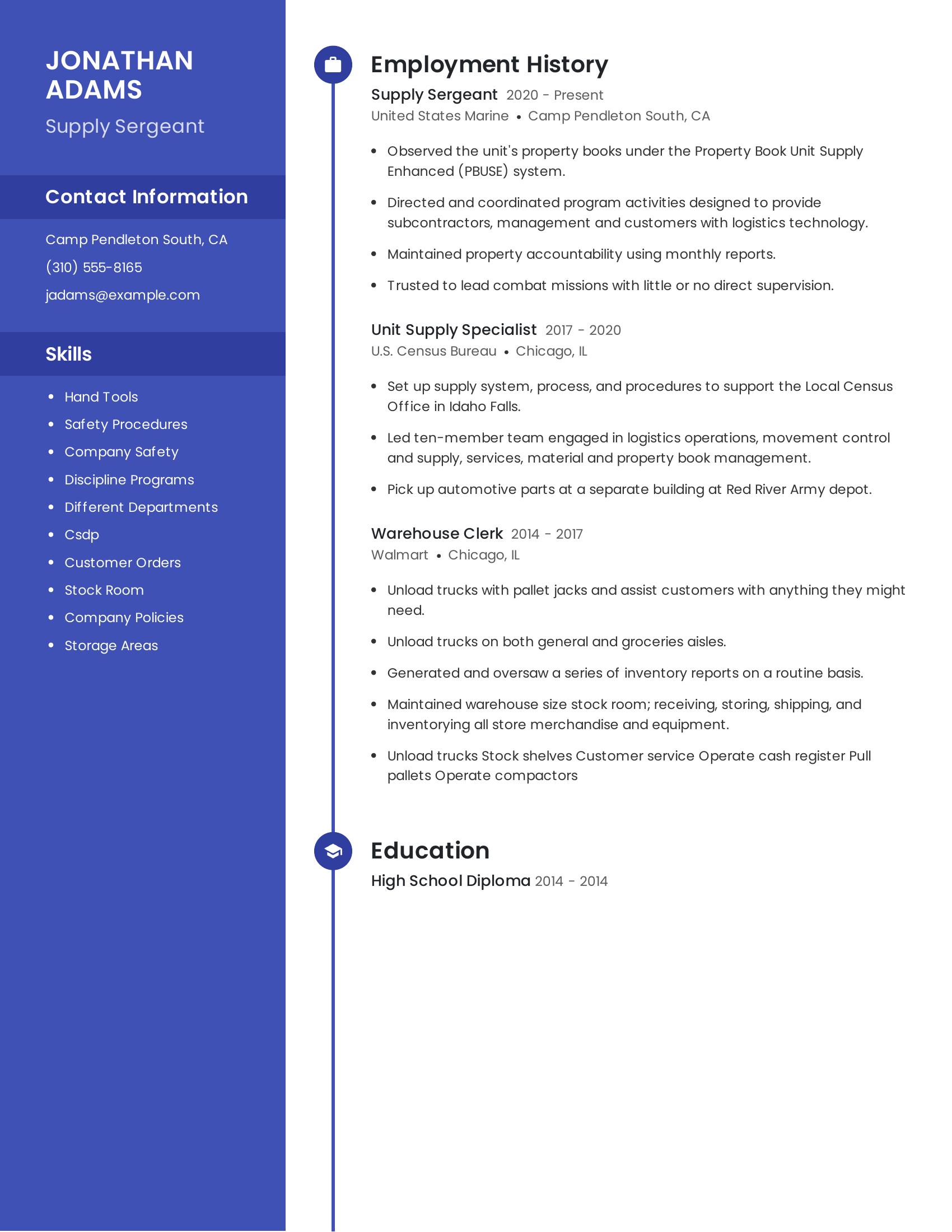
Highlight Leadership Skills. Describe your experience in leading teams, training new recruits, and managing daily operations. For example, "Led a team of 20 officers in daily patrols and coordinated emergency response efforts."
Showcase Achievements. Include specific accomplishments like reducing crime rates or improving team performance. For example, "Implemented new patrol strategies that reduced local crime by 15% over six months."
Detail Relevant Certifications. List any certifications related to law enforcement or management. For example, "Certified in Advanced Tactical Training and Conflict Resolution."
A sergeant's resume should highlight leadership experience, military training, and relevant skills. Start with contact information followed by a summary. Include a section for professional experience focusing on roles, responsibilities, and achievements. Education and certifications are important too. Add a skills section to show proficiency in areas like team management and conflict resolution.
A good sergeant summary should highlight leadership, experience, and relevant skills. Focus on concrete achievements and responsibilities.
Writing a strong sergeant summary requires clarity and relevance. Use short sentences and focus on important points.
A well-written sergeant experience section should highlight leadership, accountability, and operational skills. Use short, impactful statements. Focus on quantifiable achievements. Avoid jargon that civilians may not understand.
Use action verbs to start each bullet point. Quantify outcomes where possible. Highlight specific skills relevant to civilian jobs. Keep sentences short and clear. Avoid military-specific jargon.
A sergeant needs specific technical abilities to perform their duties effectively.
A sergeant also needs interpersonal skills to manage their team and communicate effectively.